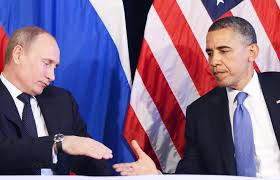The year 2014 witnessed disruptive developments: the Ebola epidemic, the creation and transformation of ISIS, and Russia’s ‘revisionism’ starting with the Ukraine crisis. Whether these events take new shape or lose their potency in 2015 remains, of course, to be seen.
Going by the rule of persistence, tomorrow will be the same as today. But this is not always so in the realm of international affairs.
In the end of 2013, it was never thought that ISIS would transform from militant organisation to an Islamic State, challenging the borders and nationalities of Middle Eastern countries. No one thought about its potential for becoming a formidable military force capable of invading one quarter of Iraq and challenging the World order. And no one thought that the Gulf Coalition would be formed to counter the expansion of ISIS with the support of the American air force.
It was not anticipated that Russia would adopt ‘revisionist’ policies and attack Ukraine, thereby challenging the progression of international law and the importance of the United Nations based on Article 2 of the UN Charter, besides coming in conflict with the West prompting the West to impose economic sanctions on Russia. And lastly, no one predicted that the Ebola outbreak would become such a grave challenge not only for Africa, but for the whole world including inter governmental organisations such as the WHO.
Given the complex nature of the Ebola crisis, it seems that the virus will continue to take lives. In fact, there is a danger that the epidemic may spread to other parts of the world, unless effective quarantine measures are not taken. Given the amount of international contributions for controlling the epidemic, pessimism runs high. However, it remains important to remember that worst case predictions have not yet come true. The World Health Organisation (WHO) warned that there could be 10,000 new Ebola cases by December. It was also predicted by the Centers for Disease Control and Prevention that around 1.4 million people would be affected by the virus by January 2015. So far this seems unlikely. The total number of cases are around 16,000 and the death toll is around 7,000.
The situation in the Middle East is also improving as the threat of the ISIS gradually, perhaps deceptively for now, recedes. It will get some success in Syria and Iraq, and may attract more people. But it is losing its potential and capabilities of expanding the Islamic Caliphate to include the whole of the Middle East. According to West Point’s Combating Terrorism Center, its financing, leadership, mobility and weapons are contracting. Initially, it succeeded in capturing the areas of Iraq and Syria and established the Caliphate without much effort because its enemies were unprepared and it took them by surprise. Also, the Middle East was not united against ISIS at the time. Now, it has to fight against the alliance of more than 60 nations from Europe, the Middle East and Asia. Although the US with the assistance of the Gulf coalition is only fighting against ISIS, other nations are actively creating constraints for ISIS to expand to other parts of the world and to increase its military capabilities. This is the reason that there is no major ISIS gain since the Gulf coalition and since the US led operation against it. Lina Khatib writes in the New York Times: “ISIS can only expand in areas where it can enter into partnerships with the local population, and that largely limits the scope of the expansion of ISIS to Sunni, disenfranchised areas.”
And now to Russia. In 2015, Putin will be weaker, given the economic hardship Russia is currently facing and its effects on social security packages. Like ISIS, Putin had underestimated the reactions of the West and the European Union. He might have been feeling confident of the EU, because of the latter’s dependence on Russian gas. However, the action in Ukraine has isolated Putin worldwide as evidenced from the recent G20 meeting in Brisbane. It is feared that if Russia remains determined to continue its policies of ‘revisionism’, the world may experience another Cold War.
Besides these trend lines heading into 2015, there are other crises as well: the challenges of climate change, drug trafficking, cyber-attacks, political instability in the Middle East, instability of oil prices and the movements for democratic empowerment such as in Hong Kong. As this year concludes, it is with some caution that we observe how much these events will influence the coming year.
The writer is a political scientist based in Islamabad.
Sunday, November 24, 2024
What will matter in 2015?

Patient passes away near Jhelum Bridge due to road closure
November 24, 2024
IESCO notifies power shutdown programme
November 24, 2024
ANP to observe black day in KP on 25th
November 24, 2024
‘PPP serving masses without discrimination’
November 24, 2024
KP delegation holds talks for peace in Kurram
November 24, 2024
-
Digital nomadism redefines work and travel across the globe
-
Digital nomadism redefines work and travel across the globe
-
Lahore tops global pollution rankings as smog worsens, AQI reaches hazardous levels
-
Hunger crisis to increase in South Sudan, warns UN
-
Pakistan’s judiciary champions climate justice at COP29 in Baku
-
Punjab struggles with persistent smog as Met Office forecast rainfall
Investing in IT
November 24, 2024
Political Limbo
November 24, 2024
Parachinar in Crisis
November 24, 2024
Paper Justice
November 23, 2024
No Silver Bullet
November 23, 2024
Artificial Intelligence Revolutionises Healthcare
November 24, 2024
SNGPL gas and RLNG cargos
November 24, 2024
De-Dollarisation
November 24, 2024
Break Free From Plastic
November 24, 2024
Escalating Perils
November 24, 2024
ePaper - Nawaiwaqt
Nawaiwaqt Group | Copyright © 2024





